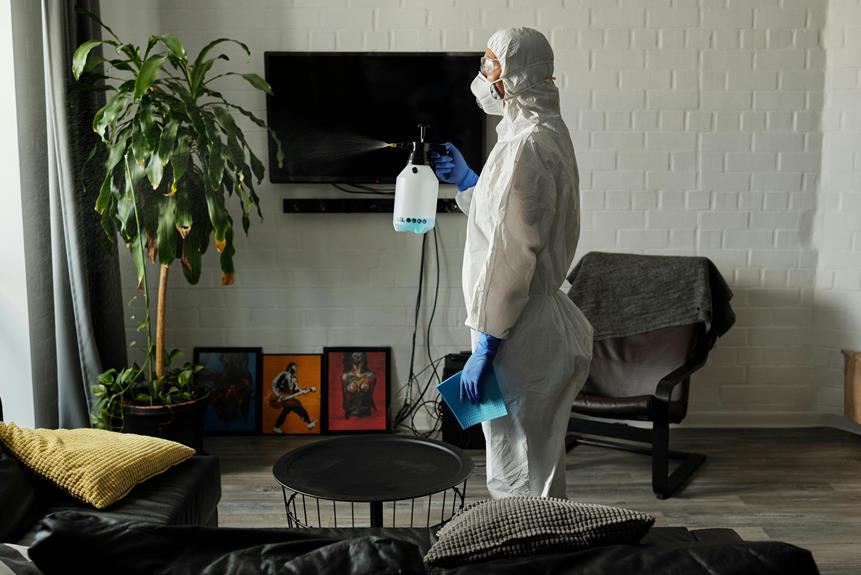If you do not own a television or watch live broadcasts, including BBC iPlayer, you may be eligible to declare no need for a TV licence. This exemption applies to homes without any TV receiving equipment or those using only non-live, on-demand services like S4C. It is essential to formally declare this status through TV Licensing's online form or by contacting them directly to avoid penalties such as fines or enforcement visits. Properly confirming and updating your exemption status guarantees you remain compliant with the licensing laws. Exploring further can provide greater clarity on maintaining your exempt status under various circumstances.
Eligibility for No TV Licence
Are you free from the need for a TV licence?
Homes that are completely empty, devoid of any TV equipment, qualify for this exemption.
Additionally, if you watch on-demand services like S4C and live TV without using platforms such as BBC iPlayer, you remain eligible.
Declaring No Need for Licence
If you find yourself not requiring a TV licence, it is essential to formally declare this status.
Contact TV Licensing or complete their online form to declare you no longer need a licence.
Upon successful declaration, you'll receive confirmation of your exemption.
Remember to update your circumstances if they change, as failing to do so can lead to fines and enforcement actions.
Consequences of Not Declaring
Failing to inform TV Licensing that you no longer require a TV licence can have serious consequences.
Not declaring your exemption or that you do not need a licence can lead to fines up to £1,000 for unlicensed live TV viewing.
Enforcement visits may be conducted to check compliance, escalating penalties.
Proactively declare your status to avoid these legal repercussions and guarantee peace of mind.
Special Cases and Exceptions
While it is important to declare a lack of need for a TV licence to prevent legal issues, there are also specific conditions and exceptions in the licensing requirements that provide flexibility for certain viewers.
Residents in care homes may qualify for a reduced licence fee, and those in joint tenancy setups in communal living areas often need only one licence for shared spaces.
Certain educational and non-profit activities are also exempt.
Resources and Support
Understanding how to navigate the complexities of TV licensing is made easier through the various resources and support offered by the official TV Licensing website.
Whether you need to pay for a licence to watch TV, are watching TV that's covered by a TV licence, or qualify for free or discounted TV, the site provides FAQs, contact information, and updates to assist you.
Verification Measures
To guarantee adherence to TV licensing regulations, TV Licensing may deploy officers to conduct home visits aimed at verifying exemption statuses.
During these visits, individuals must provide documentation proving their exemption from the need for a licence. Officers are authorized to check for equipment used to watch live TV, ensuring compliance.
Regular updates facilitate ongoing verification and strengthen the integrity of the licensing system.
Frequently Asked Questions
Do I Need a TV License With No TV?
Regarding TV license requirements, no license is needed if you do not watch or record live TV and only use streaming services or on-demand non-live content. Understand the legal implications and alternatives to traditional television.
Can I Cancel My TV Licence if I Only Watch Netflix?
Yes, you can cancel your TV licence if your viewing is limited to Netflix, as it does not fall under traditional broadcasting regulations. Make sure you follow the proper cancellation process to meet legal requirements.
What Channels Can I Legally Watch Without a TV Licence?
Legally, without a TV licence, you can watch non-live online content on streaming services like Netflix and Amazon Prime Video. Catch-up television on platforms other than BBC iPlayer is also permissible.
Who Is Exempt From Paying a TV Licence?
Exempt categories from TV licence fees include individuals over 75 with Pension Credit, students under specific conditions, care home residents, and those with temporary or special circumstances, such as certain disabilities or religious exemptions.
Conclusion
In summary, individuals not requiring a TV licence must navigate a series of obligations, including the declaration of their non-need to avoid legal consequences. Special cases provide exceptions, highlighting the necessity for awareness and understanding of the specific regulations. Adequate resources and support are vital for compliance, as are robust verification measures to guarantee adherence to the rules. It remains essential for those exempt from the licence to adhere strictly to the stipulated guidelines to prevent potential legal challenges.



